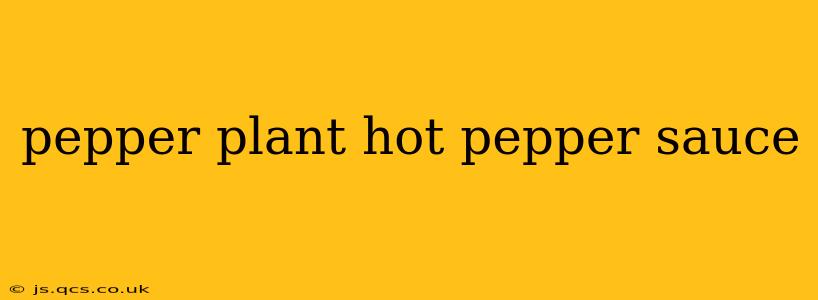The vibrant heat of homemade hot pepper sauce, crafted from peppers you nurtured from seed, is an unparalleled culinary experience. This guide delves into the journey from planting pepper seeds to bottling your own fiery creation, answering common questions along the way.
What are the best pepper plants for hot pepper sauce?
The ideal pepper for your sauce depends on your spice preference. For mild heat, consider Anaheim or Poblano peppers. Medium heat options include jalapeños and serranos. If you crave intense heat, explore habaneros, Scotch bonnets, or even ghost peppers (proceed with caution!). Experimenting with a blend of pepper varieties can create unique flavor profiles and heat levels. Consider factors like growing conditions in your area when selecting your pepper plants; some varieties thrive in warmer climates than others.
How to grow pepper plants for hot pepper sauce?
Growing your own peppers is incredibly rewarding. Start by selecting high-quality seeds – often available at garden centers or online. Begin indoors 6-8 weeks before the last expected frost, sowing seeds in seed trays filled with a well-draining seed-starting mix. Keep the soil consistently moist but not soggy. Once seedlings develop several true leaves (the leaves that are different from the seed leaves), transplant them into individual pots.
Hardening off is crucial before planting outdoors. Gradually acclimate the seedlings to outdoor conditions over a week or so, increasing their exposure to sunlight and wind each day. Plant them in a sunny location with well-drained soil, spacing them according to the specific variety's requirements. Regular watering, fertilization, and pest control are essential for healthy growth.
How do you make hot pepper sauce from pepper plants?
Once your peppers have ripened to their full color, it's time to make your sauce! Here's a basic process:
- Harvest: Carefully pick the ripe peppers, wearing gloves to avoid skin irritation.
- Clean: Wash the peppers thoroughly to remove dirt and debris.
- Prepare: Remove stems and any damaged parts. You can roughly chop the peppers or leave them whole, depending on your desired texture.
- Cook (optional): Roasting or simmering the peppers can enhance their flavor and reduce bitterness. Add a little oil or water to prevent sticking.
- Blend: Using a blender or food processor, carefully puree the peppers. Add other ingredients like vinegar, garlic, onions, or spices to customize your sauce.
- Strain (optional): If you prefer a smoother sauce, strain the puree through a fine-mesh sieve.
- Bottle and Preserve: Pour the sauce into sterilized jars, leaving headspace for expansion. Process in a boiling water bath for proper preservation (refer to canning guidelines for specific times and instructions).
What are the different types of hot pepper sauce?
Hot sauce is incredibly diverse! The type of pepper used forms a crucial part of its identity. However, the addition of other ingredients like vinegar, garlic, onions, and spices creates a wide variety of flavors and heat levels. Some popular types include:
- Simple Pepper Sauce: This focuses on the pepper's flavor, often just pepper, vinegar, and salt.
- Garlic Pepper Sauce: Garlic adds a pungent layer of flavor to the heat.
- Sweet Pepper Sauce: Sweeteners, like sugar or honey, balance the heat.
How do you preserve homemade hot pepper sauce?
Proper preservation is key to preventing spoilage. The most common and reliable method is water bath canning. This involves sealing your sauce in sterilized jars and processing them in boiling water for a specific duration (refer to tested recipes for precise times based on your altitude). Always follow safe canning practices to avoid bacterial contamination. Improperly canned hot sauce can lead to spoilage and potential health risks.
How long does homemade hot pepper sauce last?
Properly canned hot pepper sauce can last for 12-18 months or more, if stored in a cool, dark, and dry place. Uncanned hot sauce should be refrigerated and used within a few weeks to maintain freshness and prevent spoilage. Always check for signs of spoilage before consumption, such as mold growth or off-odors.
This comprehensive guide provides a solid foundation for your journey into the world of homegrown hot pepper sauce. Remember, the best sauce is the one you create, tailored to your taste preferences and growing conditions. So, get planting and get saucing!
